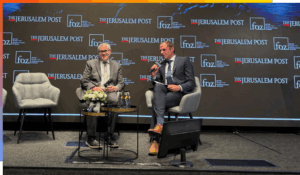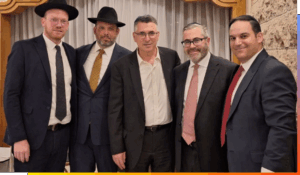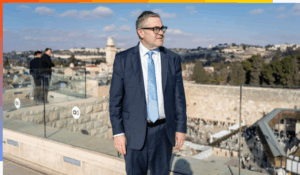I hope this summer finds you well and meaningfully engaged. For me, these warmer days have been anything but idle. After months of being grounded due to the war and various challenges, I have finally been able to hit the road again, visiting cities, camps, and communities across the country. I must tell you, there is no greater privilege than being with our people face to face, heart to heart. Every stop reminds me of the incredible spirit and resilience of the Jewish nation. Every conversation reaffirms the sacred partnership that exists between Aish and those who love and support our mission. It is uplifting, energizing, and more necessary now than ever.

This past Sunday marked the beginning of the Three Weeks, a time on the Jewish calendar when we take a step back and collectively mourn some of the greatest tragedies in our national history. I had the merit to speak at Camp Mesorah, delivering words of reflection to a group of Jewish teenagers during Mincha. What struck me most was how eager they are to understand not just what we mourn, but why. I asked them why we begin this period of mourning with a fast on the 17th of Tammuz, weeks before Tisha B’Av, the day we mark the destruction of the Beit HaMikdash. Why not just fast on the day itself?
The answer lies in understanding the process of destruction, not just its end. The walls of Jerusalem were first breached on the 17th of Tammuz, and the full collapse came later. There was a slow unraveling, a painful deterioration, and a mounting sense of dread. With each passing day, the question loomed larger: would we survive? Would the Jewish nation endure exile?
The uncertainty was crushing. It is hard to imagine the trauma of leaving our homeland, heading into an unknown diaspora where we would be attacked, marginalized, and stripped of security in nearly every land we entered. Although there were prophecies of our eventual return, could anyone at that moment feel truly confident? Despite that fear, here we are. Am Yisrael Chai.

The Three Weeks serve as a spiritual wake-up call. The Talmud in Yoma teaches that the Second Temple was destroyed due to sinat chinam, baseless hatred. Rav Kook taught that the Third Temple will be rebuilt through ahavat chinam, unconditional love. The mourning of this period is not about sadness for its own sake. It is about taking responsibility. It is about learning from our past so we can secure our future. If hatred brought us down, then love must lift us back up.
Each year, AISH puts together a very special project, our annual film documentary, which focuses on the above lesson. Our documentaries don’t only focus on the sadness of the tragedy that occurred to our people on October 7th, but also on the hope, the strength, and the love that emanate from the pain and loss that we all experienced. This year’s documentary is especially powerful and focuses on four stories of individuals and families who overcame their own loss and grief to persevere with resilience and love. The stories we share in this documentary are those of unshakable faith that carries us forward.
I shared with the teens a powerful moment from our modern history that captures this spirit. We are all aware of the recent joint Israeli-American strikes on Iranian nuclear facilities. However, we must also remember 1981, when Prime Minister Menachem Begin ordered the destruction of Saddam Hussein’s nuclear reactor in Iraq. He did not hide behind ambiguity. He announced it boldly. Then he walked to the Kotel and stood in front of Holocaust survivors. He told them that when someone threatens the Jewish people, we take it seriously. This is Jewish leadership rooted in Jewish memory and grounded in our eternal mission.

After Camp Mesorah, I traveled to St. Louis to visit two dear friends, Charlie and Naomi Ruth Deutsch. Not everyone knows this, but St. Louis was the first Aish branch outside of Israel. Sitting with them, we reflected on Rav Noach Weinberg zt”l, the founding vision of Aish, and how far we have come. Their dedication to Aish and the Jewish people has never wavered. I remain deeply grateful for their commitment and their vision.
From there, I traveled to Los Angeles and shared a beautiful and deeply meaningful dinner with Lori Miller and Phil Lieberman, joined by Rabbi Ben Gonsher. We spoke at length about our dreams for the future, especially the launch of the Suzana and Ivan Kaufman Aish Institute for Women’s Education. Their support has been incredible, and their partnership in this project reflects a shared passion for the Jewish future. These are people who do not just believe in Jewish education; they help build it.

This new initiative, the Institute for Women’s Education, has brought me a level of excitement I have not felt in years. We are creating a state-of-the-art campus with over 200 beds for young women who are passionate about Judaism, about Israel, and about the Almighty. When you walk through the current program’s halls, you immediately feel three things: wisdom, love, and responsibility. These young women are studying our sacred texts with rigor and depth. They are forming lifelong connections with one another, with their teachers, and most importantly, with Hashem. They are learning not only to love Torah, but also to love every Jew. Among them is a very special group of young women who have served in the IDF and, following their service, made the decision to come learn at Aish. Their presence brings an added layer of strength and responsibility to our halls, and their commitment to the Jewish people is deeply inspiring.
This is what the Three Weeks should inspire in us, not just mourning, but a deep yearning to rebuild. It is a time to take ownership, to recommit ourselves to the mission of the Jewish people. This initiative is already creating waves of excitement around the world. Our partners consistently share how inspired they feel, how full of hope they are, and how ready they are to build something lasting.

As I write this message, I am en route to Denver to spend Shabbat with our wonderful branch there. I look forward to sharing more about that visit next week. For now, I want to share one final reflection. The Jewish people are strong. Aish is strong. Our connection with the Almighty is stronger than ever.








